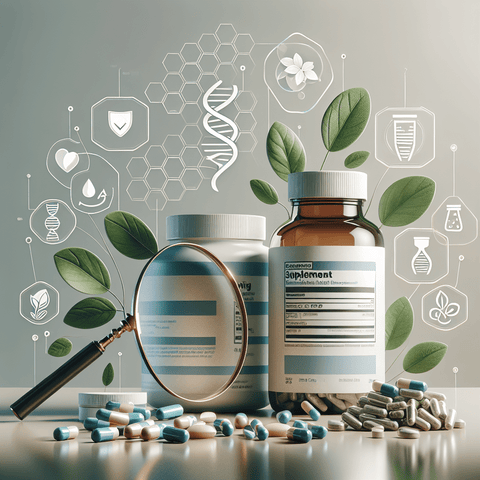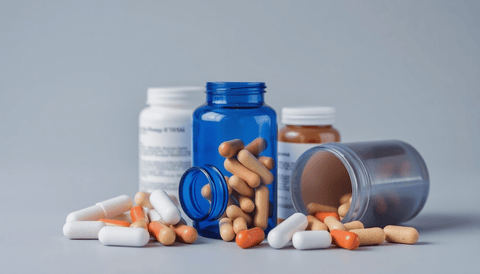Introduction: Navigating the World of Nutritional Supplements
In today’s health-conscious society, nutritional supplements have become more than a passing trend—they're a booming multi-billion-euro industry, globally embraced by people aiming to optimize their wellness. From vitamins, minerals, and botanicals to proteins, omega-3s, and probiotics, the diversity of products available can be both exciting and overwhelming. As these health tools grow in popularity, the supplement market has seen a surge in new brands—some trustworthy, many not. For beginners navigating this space, choosing a trusted supplement brand is essential for both safety and results. Unfortunately, not all supplements are created equal. Due to the relatively lenient regulatory framework surrounding them, some companies are able to market subpar or even dangerous products. This means that consumers are often left to do their own due diligence. If you're shopping for vitamins or other dietary supplements, making informed decisions is crucial to avoid ineffective or harmful products. This guide empowers you with all the tools you need to make safe and smart supplement purchases, especially if you're new to this landscape. We'll explore what defines a reputable brand, the certifications and tests that matter, where to shop safely, and how to spot red flags. We'll also highlight some reliable resources and introduce category pages from trusted sites like topvitamine.com where vetted supplement products are available. When you're done reading, you'll not only understand the mechanics of smart supplement buying, but you'll also feel empowered to make decisions that benefit your health long-term. Let’s dive in.What Defines a Trusted Supplement Brand in Nutritional Supplements
Not all supplement brands deserve your time—or your money. Trusted supplement brands aren't just those with flashy labels or trendy marketing. They are companies who consistently put science and transparency first, prioritize safety, and help consumers understand what they’re taking and why it matters. One of the core pillars of a reliable brand is transparency. Reputable companies clearly list ingredients, their sources, dosages, and any relevant scientific backing. They avoid proprietary blends that hide ingredient amounts and commit to making their sourcing and manufacturing practices visible. A transparent company tells you what’s in your supplement and why it’s there—nothing more, nothing less. Another hallmark is science-backed formulations. Trusted brands invest in clinical studies and ensure that dosages match those used in validated research. For instance, if a vitamin D supplement claims to support bone health, it should offer an amount of the nutrient that's been studied for that benefit within EFSA-approved guidelines. A quick visit to sites like Topvitamine's Vitamin D category shows several products that adhere to these evidence-based principles. Trusted brands also boast strong online presence and transparency through third-party reviews and plenty of customer feedback. Independent reviews on forums, health websites, or retailer platforms often reflect real user experiences. Additionally, endorsements or clinical testing published in peer-reviewed journals is another signal of quality. Look for brands that offer educational materials both on their labels and websites. Blogs, supplement facts sheets, and FAQ sections tailored to different needs (athletes, elderly, vegans, etc.) are a great sign the brand is driven to inform rather than just sell. Here are some quick indicators that suggest a supplement brand can be trusted: - Full disclosure of ingredients and dosages - Evidence drawn from peer-reviewed research - Educational content meant to inform - Clear labeling with batch numbers and expiration dates - Strong customer feedback with minimal complaints across reputable platforms In practice, these are the factors that separate health-focused supplement manufacturers from profit-focused ones.Recognizing Reliable Supplement Companies: What Sets Them Apart
Now that you know what defines a trusted brand on paper, it's time to look at what makes companies stand out in the real world. Reliable supplement companies invest in long-term goals and consumer loyalty—not just short-term profits. This shows up in several specific ways. One critical characteristic is longevity. Brands that have been in the market for decades often have well-documented histories of providing clean, effective, and safe products. Time-tested companies weather trends by staying true to scientific integrity and evolving only when supported by research. Ethical sourcing is another non-negotiable feature. Brands should openly discuss where and how they source raw materials—like magnesium from seawater or vegan DHA from algae. To ensure quality and ecological responsibility, many reputable brands undergo sustainability audits. An example of a reliable category supported by ethical sourcing can be seen in Topvitamine’s Omega 3 collection, where formulations are derived from certified-sustainable marine sources. Also noteworthy is customer service and how companies handle questions, recalls, or product updates. If a company readily provides Certificate of Analysis (CoA) documentation or promptly addresses complaints, that's a vote of confidence. Reliable companies have detailed customer service portals and live support—because they care about user experiences. Let's explore a case in point. Brand X (a hypothetical example based on characteristics shared by many Topvitamine partners) has operated for over 25 years, specializes in plant-based organics, features a physician advisory board, and invests in clinical research. Their website includes a blog, FAQs, and published certification data. This level of transparency and engagement is precisely what newcomers should look for. Beginners can learn that a serious supplement company cares not just about sales, but about making users healthier and more educated. Brands that treat their customers to consistent excellence are the ones that endure and stand out across the board.Why Third-Party Tested Supplements Matter for Your Health and Safety
Third-party testing is a crucial feature of supplement validation. It means products have been independently tested outside the manufacturer’s control to confirm they contain what the label claims and are free of contaminants such as heavy metals, microbes, or banned substances. Independent organizations like USP (U.S. Pharmacopeia), NSF International, Eurofins, or Informed-Choice conduct rigorous testing under Good Laboratory Practices (GLP). Their testing evaluates: - Ingredient accuracy (matching claims) - Dosage precision - Absence of microbial contamination - Absence of heavy metals (e.g., lead, arsenic) - No undeclared synthetic drugs or allergens For consumers, this means peace of mind. Companies who invest in third-party verification show they’re serious about transparency and safety. If you’re new to supplements, look for seals such as: - USP Verified - NSF Certified for Sport - Informed-Sport or Informed-Choice - BSCG (Banned Substances Control Group) But keep in mind: seals should not be taken at face value alone. Products can be falsely marketed as third-party tested even when they’re not. That’s why consumers must verify certification by checking public databases or asking for valid CoAs upon request. Many companies now provide QR codes or batch trackers on their packaging that let users access lab results. When exploring options, especially popular products like magnesium supplements for muscle and bone support, check out the Topvitamine Magnesium category for brands that make lab transparency a top priority. Quality supplements don’t shy away from objective scrutiny. If a brand avoids third-party testing entirely, that’s a red flag. For your health and safety, it’s essential to prioritize lab-validated supplements in all your future purchases.Discovering Certified Supplement Brands: Understanding Industry Certifications
Just like third-party testing, industry certifications provide a layer of quality assurance—but they focus more broadly on how supplements are manufactured and sourced rather than just what's in them. Key certifications include: - **GMP (Good Manufacturing Practice)**: Certification of clean, well-managed, and controlled production facilities. - **USDA Organic**: Certifies that ingredients are grown without synthetic pesticides or GMOs. - **Non-GMO Project Verified**: Ensures that a product’s ingredients are not genetically modified. - **Vegan and Vegetarian Certifications**: Confirms formulations and capsules avoid animal byproducts. - **Halal and Kosher Certifications**: Validates compliance with dietary law for specific consumers. However, it’s critical to understand what certifications mean—and what they don’t. For example, GMP doesn't guarantee product efficacy, just manufacturing compliance. USDA Organic doesn't imply higher nutritional quality, only natural sourcing. No single seal equates to perfection—but multiple overlapping certifications often signal a high-quality brand. To determine if a brand has reputable certifications: 1. Visit their official site—many list certifications near the footer or product pages. 2. Use certification body databases (e.g., NSF.org). 3. Check packaging images for logos and contact customer service for verification. Beware of vague claims like “all-natural” or “pharma-grade” without clear certification backup. These aren't regulated claims and can be meaningless in context. On Topvitamine's Vitamin K collection, you’ll often find extensively certified products, showing the extra effort made to verify supplement authenticity for bones and blood clotting support. Understanding these certifications gives you the power to differentiate between clever marketing and verifiable quality—especially critical for beginners.Evaluating Supplement Quality Standards: What Every Beginner Should Know
Understanding production quality is critical when deciding what supplement brands to trust. Behind every capsule or tablet is a complex process that includes ingredient sourcing, testing, mixing, and packaging. While the FDA (in the U.S.) and EFSA (in Europe) regulate supplement marketing and safety to some extent, they do not require manufacturers to prove effectiveness. Europe has slightly tighter standards via the Novel Foods Act and EFSA's health claims clearance, but still, much of oversight depends on manufacturers self-regulating to GMPs. Beginners need to assess product labels meticulously: - Does the product list standardized extracts? - Are dosages aligned with published research? - Are any fillers, binders, or allergens disclosed? - Is the serving size realistic? - Are claims EFSA-approved? Use the EFSA database to confirm if a product’s suggested benefits are supported. For instance, “Vitamin D contributes to normal immune function” is EFSA-approved—but “Vitamin D cures infection” is not. Helpful online tools include: - Labdoor.com (tests and ranks supplements) - Examine.com (scientific breakdown of ingredients) - The NIH Supplement Fact Sheet (neutral info on nutrients) Databases aside, buying from a curated platform like Topvitamine's Vitamin C benefits section simplifies access to quality-tested and label-transparent products, offering a safe entry point into supplementation.The Importance of Clean Label Supplements: Transparency You Can Trust
Clean label supplements emphasize minimalist, transparent formulations using ingredients that are easy to read, recognize, and digest. They exclude artificial colors, flavors, preservatives, or unnecessary fillers that could interfere with your health. Why does this matter? Because the gut, liver, and kidneys process whatever you ingest—including the "inactive" ingredients. While EFSA deems various additives safe in specific quantities, the cumulative effect of long-term consumption is poorly understood. That’s where clean label brands come into play—they aim to reduce that burden. What to avoid on a label: - Artificial sweeteners (e.g., aspartame, sucralose) - Synthetic colorants (e.g., Red 40, Yellow 5) - Magnesium stearate (a controversial flow agent) - Titanium dioxide (used for whitening) - Shellac and polyethylene glycol (coating agents) Instead, look for natural flavorings, cellulose-based capsules, and recognizable plant extracts. Clean supplements also suit consumers with dietary concerns—vegans, people with allergies, or autoimmune sensitivities. By avoiding hidden animal derivatives or gluten cross-contamination, clean brands make smart supplementing more inclusive. Most importantly, clean label brands respect the intelligence of modern consumers. They want shoppers to make confident, informed decisions untainted by complex jargon or hidden ingredients.Tips for Shopping Smart: Building Confidence as a Supplement Consumer
Before pressing "add to cart," use this checklist: - Is the company transparent on ingredients, sourcing, and dosages? - Has the product been third-party tested? - Are health claims backed by EFSA-approved guidelines? - Does the seller have credible customer service? - Are batch numbers and expiry dates shown and recent? - Is the product certified (GMP, Organic, Non-GMO)? Safe places to buy supplements include: - Brand websites (for return guarantees) - Verified distributors like Topvitamine.com - Biopharmacies with reputations for scientific curation Caution with third-party platforms like public marketplaces. Always verify your source—especially for supplements trending on TikTok or Instagram. Influencers are not regulatory bodies. Helpful tools: - Yuka or Think Dirty (scans cosmetic and supplement labels) - Supplement reviews from Examine.com and Labdoor Education is your strongest purchasing asset. Smart consumers ask questions, read labels, and stay up to date.Red Flags: How to Avoid Scam Brands and Unsafe Products
Scam brands exploit urgency and misinformation. Watch for the following red flags: - Claims that promise disease cures or immediate results - Brands with zero human reviews or fake testimonials - Hidden contact information or lack of physical address - Ingredients hidden behind “proprietary blends” - No trace of third-party testing - Over-reliance on influencer marketing Proprietary blends are particularly deceptive. They enable a brand to legally hide ingredient amounts, simply listing a synergistic "blend" total. This can mask under-dosing of key ingredients or presence of unnecessary stimulants. Compare actual dosages with research-backed recommendations. Don’t just follow hype because a celebrity uses it. When in doubt, skip the brand altogether. Safer alternatives almost always exist on sites like Topvitamine that pre-screen supplements for quality and safety.Final Thoughts: Empowering Yourself Through Knowledge and Smart Choices
Choosing a reliable supplement brand doesn’t require expert-level knowledge—it requires commitment to checking facts, asking questions, and putting your health first. This guide has walked you through: - What makes a brand worth trusting - Recognizable certifications and seals - Clean label transparency - How to shop smarter and avoid scams The best supplement decisions come from being informed. The body deserves safe, tested, honest nutrition—and that begins with the choices you make at checkout. Take your next step toward better health by exploring the curated, science-validated collection of supplements at Topvitamine.com. Prioritize your wellbeing like a professional.Q&A Section
Q: Why should I trust third-party testing?A: Third-party testing ensures a product matches what it claims—free of contaminants and correctly dosed. It adds an independent layer of credibility. Q: Is buying from Amazon or eBay risky?
A: Yes, resellers may offer expired or counterfeit products. Trusted platforms like Topvitamine verify all inventory and brands for quality assurance. Q: What does the GMP seal mean?
A: GMP (Good Manufacturing Practice) certifies that a supplement was produced in a clean, regulated, and quality-controlled environment. Q: How can I tell if a product is making illegal health claims?
A: If a product claims to treat, diagnose, or cure a disease, it violates EFSA standards. Only structure/function claims are legally allowed.



